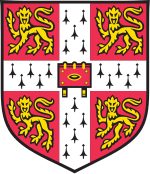The University of Cambridge (legally The Chancellor, Masters, and Scholars of the University of Cambridge) is a collegiate public research university in Cambridge, United Kingdom. Founded in 1209 and granted a Royal Charter by King Henry III in 1231, Cambridge is the second-oldest university in the English-speaking world and the world's fourth-oldest surviving university. The university grew out of an association of scholars who left the University of Oxford after a dispute with the townspeople. The two 'ancient universities' share many common features and are often referred to jointly as 'Oxbridge'. The history and influence of the University of Cambridge has made it one of the most prestigious universities in the world.
Cambridge is formed from a variety of institutions which include 31 constituent Colleges and over 100 academic departments organised into six schools. Cambridge University Press, a department of the university, is the world's oldest publishing house and the second-largest university press in the world. The university also operates eight cultural and scientific museums, including the Fitzwilliam Museum, as well as a botanic garden. Cambridge's libraries hold a total of around 15 million books, eight million of which are in Cambridge University Library, a legal deposit library.
In the fiscal year ending 31 July 2018, the central university, excluding colleges, had a total income of £1.965 billion, of which £515.5 million was from research grants and contracts. At the end of the same financial year, the central university and colleges together possessed a combined endowment of over £6.4 billion and overall consolidated assets of £12.2 billion. The latter figure was £400 million higher than the previous financial year. By both endowment size and consolidated assets, Cambridge is the wealthiest university in the United Kingdom. The university is closely linked with the development of the high-tech business cluster known as 'Silicon Fen'. It is a member of numerous associations and forms part of the 'golden triangle' of English universities and Cambridge University Health Partners, an academic health science centre.
As of 2019, Cambridge is the top-ranked university in the United Kingdom according to all major league tables. Cambridge is ranked the world's second best university by the Times Higher Education World University Rankings, ranked 3rd worldwide by Academic Ranking of World Universities, 6th by QS, and 7th by US News. Cambridge was ranked #10 in the 2016 and 2018 Nature Index Annual Tables, which measure the largest contributors to papers published in 82 leading scientific journals.According to the Times Higher Education ranking, no other institution in the world ranks in the top 10 for as many subjects.
The university has educated many notable alumni, including eminent mathematicians, scientists, politicians, lawyers, philosophers, writers, actors, monarchs and other heads of state. As of March 2019, 118 Nobel Laureates, 11 Fields Medalists, 7 Turing Award winners and 15 British Prime Ministers have been affiliated with Cambridge as students, alumni, faculty or research staff. University alumni have won 194 Olympic medals.


